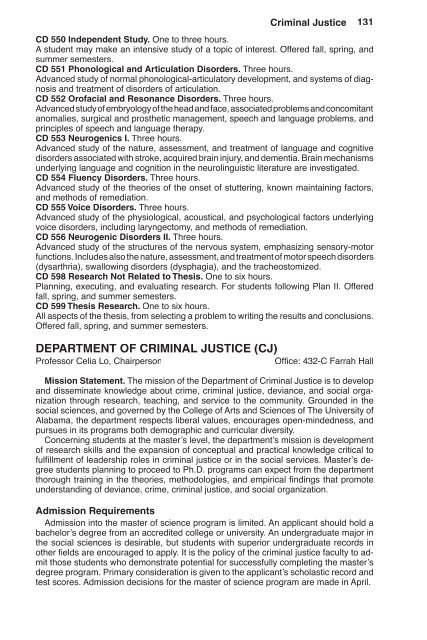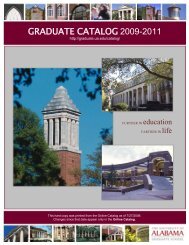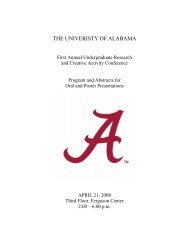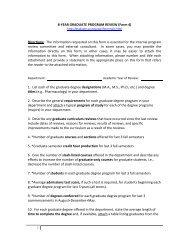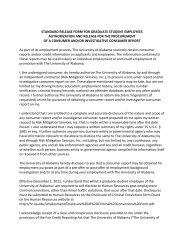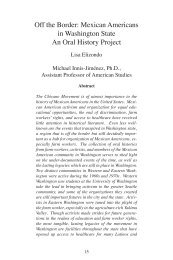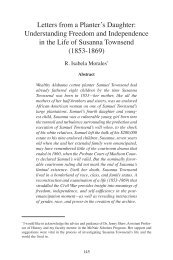- Page 1 and 2:
Graduate Catalog 2003 - 2005
- Page 3 and 4:
2 The University of AlabamaThe Uni
- Page 5 and 6:
4 The University of AlabamaLegal St
- Page 7 and 8:
6 The University of AlabamaFINANCIA
- Page 9:
8 The University of Alabama2004Janu
- Page 17 and 18:
16 The University of AlabamaOFFICER
- Page 19 and 20:
18 The University of AlabamaGRADUAT
- Page 21 and 22:
20 The University of AlabamaQUALIFI
- Page 23 and 24:
22 The University of AlabamaPAGANI,
- Page 25 and 26:
24 The University of AlabamaWEBER,
- Page 27 and 28:
26 The University of AlabamaMusicBR
- Page 29 and 30:
28 The University of AlabamaWomen
- Page 31 and 32:
30 The University of AlabamaInforma
- Page 33 and 34:
32 The University of AlabamaCommuni
- Page 35 and 36:
34 The University of AlabamaSchool
- Page 37 and 38:
36 The University of AlabamaLINDLY,
- Page 39 and 40:
38 The University of AlabamaCOLLEGE
- Page 41 and 42:
40 The University of AlabamaSCHOOL
- Page 43 and 44:
42 The University of AlabamaHISTORY
- Page 45 and 46:
44 The University of AlabamaCENTER
- Page 47 and 48:
46 The University of AlabamaOther R
- Page 49 and 50:
48 The University of AlabamaGraduat
- Page 51 and 52:
50 The University of AlabamaLex Ard
- Page 53 and 54:
52 The University of AlabamaFred Bo
- Page 55 and 56:
54 The University of AlabamaMarvin
- Page 57 and 58:
56 The University of AlabamaElton B
- Page 59 and 60:
58 The University of AlabamaAlabama
- Page 61 and 62:
60 The University of AlabamaEach sc
- Page 63 and 64:
62 The University of AlabamaMiscell
- Page 65 and 66:
64 The University of Alabamaables (
- Page 67 and 68:
66 The University of AlabamaDelinqu
- Page 69 and 70:
68 The University of AlabamaAlthoug
- Page 71 and 72:
70 The University of Alabamaby writ
- Page 73 and 74:
72 The University of AlabamaGRADUAT
- Page 75 and 76:
74 The University of AlabamaEnglish
- Page 77 and 78:
76 The University of Alabama(Minist
- Page 79 and 80:
78 The University of Alabamastep of
- Page 81 and 82: 80 The University of AlabamaACADEMI
- Page 83 and 84: 82 The University of AlabamaThree l
- Page 85 and 86: 84 The University of AlabamaConditi
- Page 87 and 88: 86 The University of AlabamaAny dep
- Page 89 and 90: 88 The University of Alabamacontact
- Page 91 and 92: 90 The University of AlabamaREGISTR
- Page 93 and 94: 92 The University of AlabamaSix sem
- Page 95 and 96: 94 The University of AlabamaClinica
- Page 97 and 98: 96 The University of AlabamaMASTER
- Page 99 and 100: 98 The University of AlabamaCompreh
- Page 101 and 102: 100 The University of Alabamathe st
- Page 103 and 104: 102 The University of Alabamaif the
- Page 105 and 106: 104 The University of AlabamaFinal
- Page 107 and 108: 106 The University of AlabamaFIELDS
- Page 109 and 110: 108 The University of Alabamaprogra
- Page 111 and 112: 110 The University of Alabamaof Ant
- Page 113 and 114: 112 The University of AlabamaANT 52
- Page 115 and 116: 114 The University of AlabamaANTH 6
- Page 117 and 118: 116 The University of AlabamaDegree
- Page 119 and 120: 118 The University of AlabamaART 52
- Page 121 and 122: 120 The University of AlabamaDegree
- Page 123 and 124: 122 The University of AlabamaBSC 53
- Page 125 and 126: 124 The University of AlabamaBSC 58
- Page 127 and 128: 126 The University of AlabamaBSC 69
- Page 129 and 130: 128 The University of AlabamaCH 564
- Page 131: 130 The University of Alabamaplacem
- Page 135 and 136: 134 The University of AlabamaTrack
- Page 137 and 138: 136 The University of AlabamaDegree
- Page 139 and 140: 138 The University of AlabamaAdmiss
- Page 141 and 142: 140 The University of Alabamahours
- Page 143 and 144: 142 The University of Alabamathe Gr
- Page 145 and 146: 144 The University of AlabamaThe st
- Page 147 and 148: 146 The University of AlabamaEN 525
- Page 149 and 150: 148 The University of AlabamaEN 600
- Page 151 and 152: 150 The University of AlabamaEN 669
- Page 153 and 154: 152 The University of AlabamaGY 538
- Page 155 and 156: 154 The University of Alabamato the
- Page 157 and 158: 156 The University of AlabamaGEO 56
- Page 159 and 160: 158 The University of AlabamaGEO 67
- Page 161 and 162: 160 The University of AlabamaSpecia
- Page 163 and 164: 162 The University of AlabamaHY 513
- Page 165 and 166: 164 The University of AlabamaHY 575
- Page 167 and 168: 166 The University of Alabama6. Eac
- Page 169 and 170: 168 The University of Alabamagenera
- Page 171 and 172: 170 The University of AlabamaMATH 5
- Page 173 and 174: 172 The University of AlabamaMATH 5
- Page 175 and 176: 174 The University of AlabamaDEPART
- Page 177 and 178: 176 The University of Alabamasecond
- Page 179 and 180: 178 The University of Alabamawill b
- Page 181 and 182: 180 The University of AlabamaFR 515
- Page 183 and 184:
182 The University of AlabamaGN 535
- Page 185 and 186:
184 The University of AlabamaSCHOOL
- Page 187 and 188:
186 The University of Alabama3. Adv
- Page 189 and 190:
188 The University of AlabamaMUS 53
- Page 191 and 192:
190 The University of AlabamaMUS 59
- Page 193 and 194:
192 The University of AlabamaMUS 69
- Page 195 and 196:
194 The University of AlabamaCourse
- Page 197 and 198:
196 The University of AlabamaAstron
- Page 199 and 200:
198 The University of AlabamaDoctor
- Page 201 and 202:
200 The University of AlabamaPSC 63
- Page 203 and 204:
202 The University of AlabamaMiscel
- Page 205 and 206:
204 The University of AlabamaPY 609
- Page 207 and 208:
206 The University of AlabamaPY 687
- Page 209 and 210:
208 The University of AlabamaThe pr
- Page 211 and 212:
210 The University of AlabamaTH 602
- Page 213 and 214:
212 The University of AlabamaGenera
- Page 215 and 216:
214 The University of AlabamaMANDER
- Page 217 and 218:
216 The University of AlabamaThe Te
- Page 219 and 220:
218 The University of Alabamaeffort
- Page 221 and 222:
220 The University of Alabamacalcul
- Page 223 and 224:
222 The University of Alabamataxati
- Page 225 and 226:
224 The University of AlabamaStuden
- Page 227 and 228:
226 The University of AlabamaDegree
- Page 229 and 230:
228 The University of Alabamamore e
- Page 231 and 232:
230 The University of AlabamaFor th
- Page 233 and 234:
232 The University of AlabamaConcen
- Page 235 and 236:
234 The University of Alabamaadditi
- Page 237 and 238:
236 The University of AlabamaAC 489
- Page 239 and 240:
238 The University of AlabamaAC 599
- Page 241 and 242:
240 The University of AlabamaEC 481
- Page 243 and 244:
242 The University of AlabamaEC 623
- Page 245 and 246:
244 The University of AlabamaFI 442
- Page 247 and 248:
246 The University of AlabamaFI 622
- Page 249 and 250:
248 The University of AlabamaOther
- Page 251 and 252:
250 The University of AlabamaMGT 53
- Page 253 and 254:
252 The University of AlabamaMIS 51
- Page 255 and 256:
254 The University of AlabamaMGS 50
- Page 257 and 258:
256 The University of AlabamaMARKET
- Page 259 and 260:
258 The University of AlabamaMKT 53
- Page 261 and 262:
260 The University of AlabamaST 521
- Page 263 and 264:
262 The University of AlabamaST 615
- Page 265 and 266:
264 The University of AlabamaGenera
- Page 267 and 268:
266 The University of AlabamaRequir
- Page 269 and 270:
268 The University of AlabamaDEPART
- Page 271 and 272:
270 The University of Alabamamunica
- Page 273 and 274:
272 The University of AlabamaGoals:
- Page 275 and 276:
274 The University of AlabamaAnd on
- Page 277 and 278:
276 The University of AlabamaMASTER
- Page 279 and 280:
278 The University of Alabamaand ap
- Page 281 and 282:
280 The University of Alabamathe ex
- Page 283 and 284:
282 The University of AlabamaA stud
- Page 285 and 286:
284 The University of AlabamaPh.D.
- Page 287 and 288:
286 The University of AlabamaBindin
- Page 289 and 290:
288 The University of AlabamaCOM 53
- Page 291 and 292:
290 The University of AlabamaJN 597
- Page 293 and 294:
292 The University of AlabamaLS 534
- Page 295 and 296:
294 The University of AlabamaLS 568
- Page 297 and 298:
296 The University of AlabamaMC 550
- Page 299 and 300:
298 The University of AlabamaCOLLEG
- Page 301 and 302:
300 The University of AlabamaCOLLEG
- Page 303 and 304:
302 The University of Alabamain sur
- Page 305 and 306:
304 The University of AlabamaCourse
- Page 307 and 308:
306 The University of Alabamastudy
- Page 309 and 310:
308 The University of AlabamaTypica
- Page 311 and 312:
310 The University of AlabamaStuden
- Page 313 and 314:
312 The University of AlabamaCAT 53
- Page 315 and 316:
314 The University of AlabamaAEL 62
- Page 317 and 318:
316 The University of AlabamaAHE 51
- Page 319 and 320:
318 The University of Alabamaand sk
- Page 321 and 322:
320 The University of AlabamaBEF 68
- Page 323 and 324:
322 The University of AlabamaSCHOOL
- Page 325 and 326:
324 The University of AlabamaBCE 54
- Page 327 and 328:
326 The University of AlabamaBEP 55
- Page 329 and 330:
328 The University of AlabamaBER 63
- Page 331 and 332:
330 The University of AlabamaBSP 66
- Page 333 and 334:
332 The University of AlabamaCEE 57
- Page 335 and 336:
334 The University of Alabama(Ed.S.
- Page 337 and 338:
336 The University of AlabamaSPE 50
- Page 339 and 340:
338 The University of AlabamaSPE 61
- Page 341 and 342:
340 The University of AlabamaSPE 53
- Page 343 and 344:
342 The University of AlabamaHPE 56
- Page 345 and 346:
344 The University of Alabamaarea,
- Page 347 and 348:
346 The University of AlabamaDEPART
- Page 349 and 350:
348 The University of AlabamaCSE 59
- Page 351 and 352:
350 The University of AlabamaCIE 57
- Page 353 and 354:
352 The University of AlabamaREADIN
- Page 355 and 356:
354 The University of AlabamaCOLLEG
- Page 357 and 358:
356 The University of Alabama33 hou
- Page 359 and 360:
358 The University of AlabamaCOURSE
- Page 361 and 362:
360 The University of AlabamaGES 64
- Page 363 and 364:
362 The University of AlabamaCourse
- Page 365 and 366:
364 The University of AlabamaAEM 57
- Page 367 and 368:
366 The University of AlabamaAEM 64
- Page 369 and 370:
368 The University of AlabamaAdmiss
- Page 371 and 372:
370 The University of AlabamaCHE 62
- Page 373 and 374:
372 The University of AlabamaCE 425
- Page 375 and 376:
374 The University of AlabamaCE 468
- Page 377 and 378:
376 The University of AlabamaCE 545
- Page 379 and 380:
378 The University of AlabamaDEPART
- Page 381 and 382:
380 The University of AlabamaCS 595
- Page 383 and 384:
382 The University of AlabamaCS 671
- Page 385 and 386:
384 The University of AlabamaECE 43
- Page 387 and 388:
386 The University of AlabamaECE 49
- Page 389 and 390:
388 The University of AlabamaECE 58
- Page 391 and 392:
390 The University of AlabamaDEPART
- Page 393 and 394:
392 The University of AlabamaIE 418
- Page 395 and 396:
394 The University of AlabamaIE 515
- Page 397 and 398:
396 The University of AlabamaIE 577
- Page 399 and 400:
398 The University of AlabamaPlan I
- Page 401 and 402:
400 The University of AlabamaME 594
- Page 403 and 404:
402 The University of AlabamaDoctor
- Page 405 and 406:
404 The University of AlabamaMTE 56
- Page 407 and 408:
406 The University of AlabamaCOLLEG
- Page 409 and 410:
408 The University of Alabamadetail
- Page 411 and 412:
410 The University of AlabamaCTD 44
- Page 413 and 414:
412 The University of AlabamaCSM 54
- Page 415 and 416:
414 The University of AlabamaHAT 55
- Page 417 and 418:
416 The University of AlabamaDEPART
- Page 419 and 420:
418 The University of AlabamaHD 698
- Page 421 and 422:
420 The University of AlabamaINTERD
- Page 423 and 424:
422 The University of AlabamaMATERI
- Page 425 and 426:
424 The University of AlabamaCourse
- Page 427 and 428:
426 The University of AlabamaMetall
- Page 429 and 430:
428 The University of Alabama• Fo
- Page 431 and 432:
430 The University of AlabamaFall (
- Page 433 and 434:
432 The University of AlabamaSpring
- Page 435 and 436:
434 The University of AlabamaSummer
- Page 437 and 438:
436 The University of AlabamaPOST-M
- Page 439 and 440:
438 The University of AlabamaNUR 58
- Page 441 and 442:
440 The University of AlabamaAdmiss
- Page 443 and 444:
442 The University of Alabamagroups
- Page 445 and 446:
444 The University of Alabamaenter
- Page 447 and 448:
446 The University of AlabamaSW 510
- Page 449 and 450:
448 The University of AlabamaSW 579
- Page 451 and 452:
450 The University of AlabamaMontgo
- Page 453 and 454:
452 The University of AlabamaIf you
- Page 455 and 456:
454 The University of AlabamaSW 620
- Page 457 and 458:
456 The University of AlabamaHuman
- Page 459 and 460:
458 The University of AlabamaCcalen
- Page 461 and 462:
460 The University of AlabamaCivil
- Page 463 and 464:
462 The University of Alabamamaster
- Page 465 and 466:
464 The University of AlabamaNOTES


